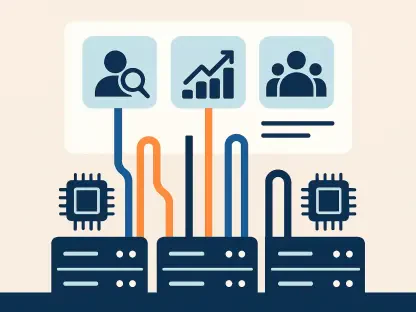In an era where digital transformation is no longer a luxury but a necessity, Appian, a leading force in the enterprise software sector, is making significant strides to solidify its dominance in AI-driven process automation, particularly across the EMEA region (Europe, Middle East, and Africa). The company has recently welcomed a group of seasoned executives into key leadership roles, a move that signals an aggressive push to capture market share in high-growth areas like the UK, Nordics, and Benelux. This strategic overhaul comes at a time when businesses across industries are clamoring for intelligent solutions to streamline operations and cut costs. With the global AI automation market poised for explosive growth, Appian’s focus on aligning its leadership with cutting-edge technology positions it as a frontrunner in meeting these demands. This article explores how the company’s new hires, combined with a robust AI monetization strategy, are set to propel its expansion and influence in EMEA, shaping the future of enterprise automation.
Strategic Hires Bolster Regional Ambitions
Appian’s latest executive appointments mark a pivotal moment in its quest to expand its footprint in EMEA, a region with a growing appetite for digital transformation. Leading the charge is Vicky Nisbet, who steps into the role of SVP of Sales for the UK and EMEA, bringing over 20 years of experience in enterprise sales across critical sectors like healthcare and financial services. Her proven track record in driving revenue growth makes her an ideal fit to spearhead Appian’s initiatives in emerging markets such as the Nordics and Benelux, where AI adoption is accelerating. Complementing her efforts are Vincent Perrin, who focuses on enhancing professional services, and Rob Cook, tasked with penetrating public sector accounts. Together, this trio forms a dynamic leadership team designed to address the diverse needs of customers across the region, ensuring that Appian’s solutions resonate with both private and public entities seeking to optimize workflows through automation.
Beyond individual expertise, these hires reflect a broader strategy to build a robust sales infrastructure tailored to EMEA’s unique challenges and opportunities. The region’s fragmented markets and varying levels of technological maturity demand a nuanced approach, something Appian appears well-equipped to deliver with this leadership lineup. Nisbet’s deep understanding of enterprise needs will likely drive tailored solutions for industries under pressure to modernize, while Perrin’s focus on service delivery ensures seamless implementation of complex automation tools. Meanwhile, Cook’s emphasis on public sector engagement taps into an often-overlooked yet lucrative segment, where governments are increasingly investing in digital infrastructure. This multi-pronged approach not only strengthens Appian’s market penetration but also positions it as a trusted partner for organizations navigating the complexities of digital transformation in a competitive global landscape.
AI Innovation as a Core Revenue Driver
Appian’s growth strategy hinges on leveraging artificial intelligence as a transformative force in enterprise software, a move that aligns with the industry’s shift toward intelligent automation. By integrating AI capabilities directly into its platform, the company offers businesses tools to enhance efficiency and reduce operational costs, addressing a critical pain point in today’s economy. The introduction of premium pricing tiers for AI-enhanced workflows demonstrates a savvy approach to monetization, capitalizing on enterprises’ willingness to invest in solutions that deliver measurable value. This mirrors successful tactics employed by other industry giants, underscoring a shared recognition of AI’s potential to reshape revenue models. Appian’s commitment to embedding AI across its offerings positions it to meet the evolving demands of a market hungry for innovation.
This focus on AI is not just about technology but about redefining how businesses operate in a digital-first world. Appian’s platform enables organizations to automate repetitive tasks, freeing up resources for strategic initiatives, which is particularly appealing in EMEA where cost pressures are acute. The premium pricing model also signals confidence in the value of these AI-driven solutions, encouraging adoption among enterprises looking to gain a competitive edge. Unlike competitors who may offer AI as an add-on, Appian’s integrated approach ensures that automation and intelligence work hand-in-hand, delivering a cohesive user experience. As companies across the region grapple with the need to modernize legacy systems, Appian’s AI strategy offers a compelling pathway to transformation, promising not just efficiency but also scalability in an increasingly complex business environment.
Financial Performance Signals Strong Momentum
The financial metrics emerging from Appian provide clear validation of its strategic direction, particularly as it scales operations in EMEA. A remarkable 21% year-over-year increase in cloud subscription revenue, reaching $106.9 million in the second quarter, highlights the growing demand for its solutions. Equally impressive is the shift to a positive adjusted EBITDA of $8.1 million, a stark contrast to previous losses, indicating that the company’s focus on AI and regional expansion is translating into sustainable profitability. These figures underscore Appian’s ability to balance innovation with fiscal discipline, a critical factor for long-term success in the competitive enterprise software market.
Beyond the headline numbers, Appian’s financial health reflects a deeper story of customer trust and market acceptance. The surge in cloud subscriptions suggests that businesses in EMEA and beyond are increasingly turning to Appian for their automation needs, validating the effectiveness of its AI-driven offerings. The positive EBITDA further demonstrates operational efficiency, a sign that investments in leadership and technology are yielding tangible returns. This financial stability provides Appian with the flexibility to continue innovating, whether through further AI enhancements or deeper market penetration in underserved areas of EMEA. For stakeholders, these results paint a picture of a company not just riding the wave of digital transformation but actively shaping it through strategic foresight and execution.
Navigating Risks Amidst Promising Opportunities
While Appian’s trajectory in EMEA appears promising, the road ahead is not without obstacles that could temper its ambitious growth plans. Intense competition from established players like UiPath and ServiceNow poses a significant challenge, as these rivals also vie for dominance in the AI automation space with robust offerings of their own. Additionally, macroeconomic uncertainties, such as potential IT budget constraints driven by global economic fluctuations, could slow adoption rates among enterprises cautious about large-scale investments. Appian must remain agile, ensuring that its solutions stand out in a crowded market while addressing customer concerns about cost and implementation complexity.
Despite these challenges, the opportunities for Appian in EMEA are substantial, fueled by a global AI process automation market projected to grow at a compound annual rate of 25% through 2030. The region’s diverse industries, from finance to manufacturing, are ripe for digital overhaul, and Appian’s targeted leadership hires position it to capture a significant share of this demand. Success will hinge on the company’s ability to execute flawlessly, integrating new executives into its operations while continuing to innovate in AI. By maintaining a customer-centric focus and adapting to regional nuances, Appian can mitigate risks and leverage its strengths to emerge as a leader in the automation landscape, setting a benchmark for others to follow.
Charting the Path Forward
Looking back, Appian’s bold steps to appoint new leaders and prioritize AI-driven automation marked a defining chapter in its journey within the EMEA region. The strategic hires of Vicky Nisbet, Vincent Perrin, and Rob Cook proved instrumental in sharpening the company’s focus on key markets, while financial gains like the surge in cloud subscription revenue reflected the efficacy of these moves. For businesses and investors who tracked this evolution, the takeaway was clear: sustained growth demanded not just innovation but also adaptability to regional dynamics and competitive pressures. Moving forward, Appian’s next steps should center on forging strategic partnerships with global system integrators to amplify its reach, alongside continued investment in AI to stay ahead of market trends. Monitoring upcoming earnings reports will offer further insight into whether these efforts solidified its standing as a trailblazer in enterprise automation.









